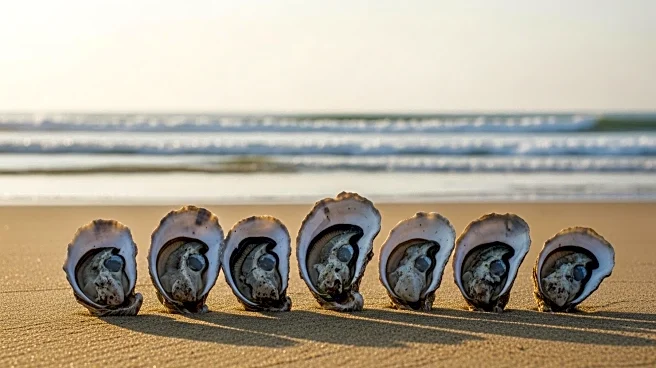What's Happening?
In Ghana, female oyster farmers are facing challenges due to climate change and the loss of U.S. aid. The Development Action Association, a nonprofit that trained women in eco-friendly oyster farming methods, lost its funding following President Trump's decision to cut foreign aid contracts. This has left the women to sustain their generational practice independently. Oyster farming, a key livelihood in Ghana's coastal mangroves, is threatened by climate change and development. Mangroves, crucial for the aquatic ecosystem, are being depleted, forcing farmers to dive deeper for oysters. Despite these challenges, the women continue to replant mangroves, a labor-intensive task, to preserve their tradition and support their families.
Why It's Important?
The loss of U.S. aid has significant implications for Ghana's female oyster farmers, who rely on mangroves for their livelihood. Mangroves provide essential ecological benefits, including protection against coastal erosion and habitat for marine life. The depletion of these resources due to climate change and development poses a threat to the farmers' economic stability and food security. The situation highlights the broader impact of foreign aid cuts on vulnerable communities and the importance of sustainable practices in combating climate change. The farmers' efforts to preserve mangroves underscore the need for international support and investment in environmental conservation.
What's Next?
The female oyster farmers in Ghana are likely to continue their efforts to protect and replant mangroves despite the challenges. They have established guidelines to prevent further destruction of mangroves, including punitive measures for offenders. The community's reliance on these ecosystems suggests ongoing efforts to balance development and conservation. The situation may prompt discussions on the need for renewed international aid and support for sustainable practices. As climate change continues to impact coastal regions, the farmers' resilience could inspire similar initiatives in other affected areas.
Beyond the Headlines
The story of Ghana's female oyster farmers highlights the intersection of gender, environmental conservation, and economic survival. The farmers' commitment to preserving their tradition and supporting their families reflects broader cultural values and resilience. The loss of mangroves not only threatens their livelihood but also poses ethical questions about the responsibility of developed nations in supporting vulnerable communities. The situation underscores the importance of integrating gender perspectives in environmental policies and the potential for grassroots movements to drive change.











